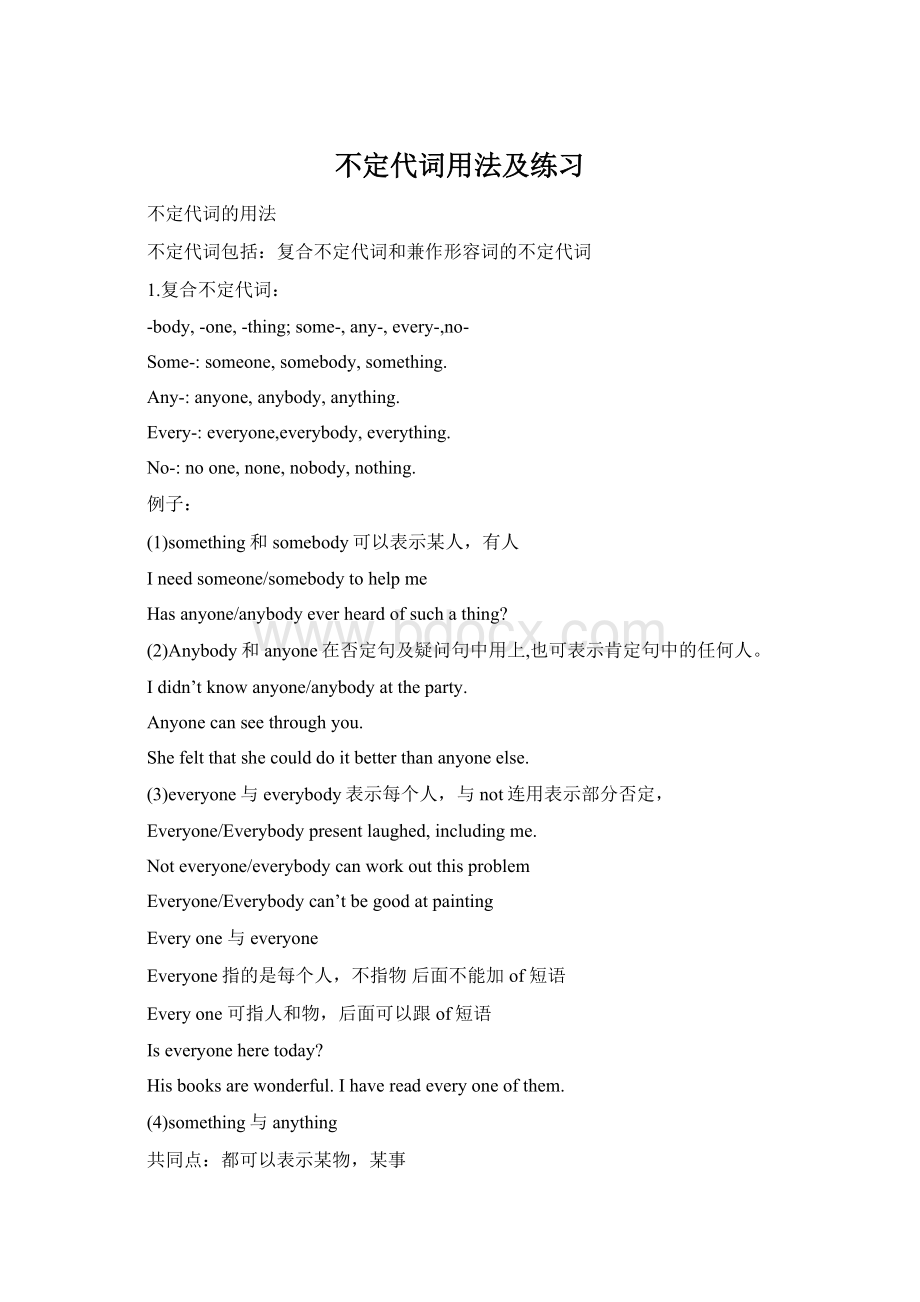不定代词用法及练习Word格式.docx
《不定代词用法及练习Word格式.docx》由会员分享,可在线阅读,更多相关《不定代词用法及练习Word格式.docx(16页珍藏版)》请在冰豆网上搜索。

Something用于肯定句中,anything用于在疑问句中
Anything,用于在肯定句中表示任何事物,在否定句中任何事物都没有
Theysawsomethinginthesky.
IsthereanythingspecialyouwanttodoorseeinBejing?
Youcanbuyanythingyouwant
SoIdon’teatanythingthat’sbeencookedinoil.
(5)everything与nothing
Peterlovesdreamingabouteverythig.
Alicehadnothingtodo.
PS:
不定代词后面加形容词:
Doyouhaveanythinginterestingtotellus?
Ihavenothingimportanttodealwithnow.
(6)nodody与noone
Nobody/Nooneknowsthesecret
Ihavenoone/nobodytotalkto.
Somebody与nobody作名词表示:
是个人物,无名小卒,小人物
Iwasnothingandnobodywitheverythingtoprove.
Heissomedodyinthecity.
all,another,any,both,each,either,few,little,many,much,neither,other,some.
2兼作形容词的不定代词;
(1)Some与any
Some修饰可数名词复数与不可数名词,表示一些,在肯定句中
Any在于否定句,疑问句和条件句之中。
SomeofthesesingerswereabletosingEnglishsongsjustaswellasnativespeakers.
Therearen’tanyastronautsinthespacecraft.
Arethereanygoodmuseumsinthecity?
在wolud开头的请求疑问句中用some
Wouldyoulikesomecoffee?
Any在肯定句中表示任何一个,任何一些
Youcanbuythisbookatany
在否定句中notany表示no
Youcanbuythisbookatanybookstoreinourcity.
Therearen’tanybusesaftermidnight.
Therearenobusesaftermidnight.
Some表示某个,修饰单数可数名词。
Somepersonisaskingtoseeyou.
(2)many,much,few,afew,little,alittle
修饰或指代可数名词
Many许多
Few很少
Afew几个
修饰或指代不可数名词
Much许多
Little很少
Alittle少许
PS:
Many与much的区别
Many修饰或指代可数名词的复数
Much修饰或者指代不可数名词
Much/many+of+限定词(the或者形容词性物主代词)+名词/代词:
不定代词+(of+限定词)+名词/代词,表示......中的很多
Englishcanhelpusunderstandmanybooksandmovies.
Youareafraidoftoomuchhomework.
Howmanyofyouhaveworkedoutthisproblem?
Muchofhermoneywasspentonclothes.
few,afew;
little,alittle
Few是many的反义词,表示很少,具有否定意义;
afew表示“一些,几个”,具有肯定意义,二者用来修饰或者指代可数名词的复数
little是much的反义词,表示很少,具有否定意义;
alittle表示少许,具有肯定意义,二者用来指代和修饰不可数名词。
Therewerefewpeoplelivingthere.
It’spolitetotakeafewflowersasagift.
Thereislittletimeleft.
ShecanspeakalittleChinese.
onlyafew意思为“仅几个”;
Onlyalittle意思为“仅一点儿”
Notafew表示“不少”;
notalittle意思为“很多”
Onlyafewkilometers.
IcanspeakonlyalittleEnglish.
Ihavemadenotafewgoodfriendshere.
Iamsorrytogiveyounotalittletrouble.
Alittle与abit都可以指代不可数名词
alittle后面直接加名词,abit+of+名词
notalittle十分,非常
notabit一点也不
Heisnotalittleangry.他非常生气
Heisnotabitangry.他一点也不生气
(3)alleach与everynone
【1】All作代词时,修饰或指代可数名词复数,指三者或三者以上的人或事。
修饰或指代不可数名词,指“一切”
Allarehere.Solet’sgetstarted.
Ibroughtallofthem.
Shehadreadthemall.
Hecalledupallhisfriendsandtoldthemabouttheproblems.
Hehasrunoutofallthemoney.
作否定时,部分否定,表示并非所有的
Notallofusagreedtotheplan.
Allofusdonotagreetotheplan.(我们并非都同意这个计划)
Noneofusagreetotheplan.
【2】each可作主语,宾语,定语,同位语;
后加of的时候若作主语,后面谓语动词用单数
Eachoftheanswersisright.
Weeachhaveourowncar.=Eachofushasourowncar.
【3】every从整体的角度说明,用于三者或者三者以上的场合,只能作定语,修饰可数名词单数,在every+名词中,谓语动词用单数。
EverystudentintheclasslikesEnglish.
【4】none只起指代作用,作主语,宾语,表语,意思是“没有一点儿”
None可以与of连用,作主语时。
若指代可数名词,则谓语单复数皆可;
若指代不可数名词时,谓语动词用单数。
Nonehave/hasarrived.
Noneofthemspeak(s)English.
noone指的人,不加of
None既可以指人也可以指的物,既可指代可数名词,也可指代不可数名词
noone是对who的回答
none是对howmany,howmuch的回答
eg:
Whotoldyouthenews?
Noone.
Howmuchmoneyhaveyougotonyou?
None.
Howmanystudenthavesignedtojointheclub?
None
(4)botheither与neither
Both表示两者都,修饰或者指代可数名词的复数,作主语时,谓语动词用复数
Either表示两者中的一个,neither表示”两者都不”,做主语时,谓语动词用单数。
Bothofuswanttogo
Bothherchildrengotothesameschool.
Eitherofyoucoulddoit.
Ithinkeithermethodwillwork.
DidyouseePeterandMike?
No,Isawneitherofthem.
Neitheransweriscorrect.
both表示否定的时候是部分否定,“两者并不都”
Bothmyparentsarenotformyplan.我父母并不都支持我的计划。
Notbothmyparentsareformyplan.我父母并不都支持我的计划。
Neithermyparentsisformyplan.我父母都不支持我的计划。
Both作同位语在实义动词之前,在系动词,be动词和情态动词之后。
Webothwenttothecinemalastnight.
Areyourparentsbothteachers.
Yes.Theybothare.
Thecouplehavebothlivedhereforyears.
Either与neither
Ifyoudon’tgo,Iwon’t,either.(neitherwillI)
Youcouldborrowsomemoneyfromyourbrother.
No,hedoesn’thaveanymoney,either.
(5)another,other(s),theother(s)
Another表示另一个,指代或者修饰可数名词的单数,
Another后有few或者是大于一的基数词的时候,可以接可数名词的复数。
Ican’tgototheparty,maybeanothertime.
Idon’tlikethisone,pleaseshowmeanother.
Youhadbetterstayathospitalforanotherfewdays.
Hewillbebackinanothertendays.
Other泛指其他的,不能单独用,只能修饰名词
Others=other+可数名词复数,泛指另一些,与some一起连用。
Givemesomeotherexamples
Someboysareplayingfootball,andothersareplayingbaskerball.
Theother指的是两者中的另一个,部分可以单独用,也可以后面接到名词
Theothers=theother+可数名词的复数“一定范围内其余的人或者是物”
Hehastwosons,oneisadoctor,andtheotherisasoldier.
Ontheothersideofthestreet,thereisasupermarket.
Ihavegottenpencils.Twoofthemarered,theothersareblue.
(6)one的用法
不定代词one既可以指人也可以指代物,只能单独使用。
复数形式用ones,所有格为one’s,反身代词用oneself。
&
one只能代替前面已经出现过的可数名词单数,为避免重复
复数ones代替可数名词的复数,泛指某些人,某些物。
Hispenwasbroken,sosheneededanewone.
Iwantlargerones,notsmallones.
one或者ones前面有the,this,that,these,those等时,特指某些人,某些物。
Whichwoman?
Theoneintheredcoat.
Thewoolenonesarehangingthere.
t
.几组常用不定代词的区别:
1.代词比较one,that和it
one表示泛指,指名称相同的另一物,或所提到的人或物中的一个。
that和it表示特指。
that与所指名词为同类,但不是同一个,而it与所指名词为同一个。
Ican'
tfindmyhat.IthinkImustbuyone.
ThehatyouboughtisbiggerthanthatIbought.
Ican'
tfindmyhat.Idon'
tknowwhereIputit.
用法
代名词
形容词
单数
复数
不定
another
另一个
others
别人,其他人
another(boy)
另一个(男孩)
other(boys)
其他男孩
特定
theother
theothers
其余那些人、物
theother(boy)
另一个男孩
theother(boys)
其余那些男孩
1)other可以作形容词用,后面可以跟单数或复数名词,意思是“其他的、别
的”。
Wherearehisotherbooks?
Ihaven'
tanyotherbooksexceptthisone.
2)other也可以用作代词,与冠词the连用构成“theother”,表示两个人或物中的“另一个”。
常与one搭配构成“one...,theother...”句型。
Hehastwobrothers.Oneis10yearsold,theotheris5yearsold.
Sheheldarulerinonehandandanexercise-bookintheother.
3)other作代词用时,可以有复数“others”,泛指“另外的人或物”。
常与some搭配构成“some....,others...”句型。
Somewenttothecinema,otherswentswimming.
Thiscoatistoolarge.Showmesomeothers,please.
4)“theothers”表示特指某范围内的“其他的人或物”。
Wegothomeby4o'
clock,buttheothersdidn'
tgetbackuntil8o'
clock.
InourclassonlyTomisEnglish,theothersareChinese.
5)another可以作形容词用,修饰后面的名词,意为“另一个”,还可以跟代词one.
Youcanseeanothershipinthesea,can'
tyou?
Marydoesn'
twanttobuythisskirt.Wouldyoupleaseshowheranotherone?
6)another也可以作代词用,表示“另一个”。
I'
mstillhungryafterI'
vehadthiscake.Pleasegivemeanother.
5.every和each的用法
1) every强调全体的概念,each强调个体概念。
Everystudentinourschoolworkshard.
Eachstudentmayhaveonebook..
2) every指三个以上的人或物(含三个),each指两个以上的人或物(含两个)。
3) every不可以作状语,each可作状语。
4) every有反复重复的意思,如everytwoweeks等;
each没有。
5) every与not连用,表示部分否定;
each和not连用表示全部否定。
Everymanisnothonest.
Eachmanisnothonest.
6.all和both的用法。
1)all和both都表示整体,但all都,指三者以上。
both 都,指两者。
在句中都可作主语、宾语、表语、同位语和定语。
AllofuslikeMr.Pope.我们都喜欢Pope先生。
(作主语)
=WealllikeMr.Pope.(作同位语)
Allthewaterhasbeenusedup.(作主语)
That'
sallfortoday.(作表语)
Whynoteatall(of)thefish?
(作宾语)
Alltheleadersarehere./Allknowledgecomesfrompractice.(作定语)
2)both和all加否定词是部分否定。
如果表示全部否定,要分别用neither和none。
Bothofusarenotgoodatsinging.
Neitherofusisgoodatsinging.
Alloftheteachersarenotforeigners.
Noneoftheteachersareforeigners..
注意:
all与none用法一样。
跟单数名词,用单数动词;
跟复数名词,用复数动词。
Allofthestudentsarethere.
All(of)themilkisthere.
7.
neither与nor的用法
1) 如前句是否定式从句,则主句用neither,而不用nor。
Ifyoudon'
tdoit,neithershouldI. 如果你不干,我也不干。
2)
如后连续有几个否定句式,则用nor,不用neither。
Hecan'
tsing,nordance,norskate.
8.neither和either的用法
1)neither表示“两者都不”,neither…nor…意为“既不…又不…”。
either表示“两者中的任何一个”,either…or…意为“或是……,或是……”
Neitheroftheanswerisright.
Ihaveneithertimenormoneytotakeatrip.
Eithersentenceisright.
Youcaneithergoorstay.
9.
many,much的用法
Many,much都意为"
许多"
,many+可数名词,much+不可数名词。
Howmanypeoplearethereatthemeeting?
Manyoftheworkerswereatthemeeting.
10
.
anyone/anyone;
noone/none的用法
1)
anyone和anyone
anyone仅指人,anyone既可指人,也可指物。
2)noone和none
a)none后跟of短语,既可指人又可指物,而noone只单独使用,只指人。
b)none作主语,谓语动词用单,复数均可,而noone作主语谓语动词只能是单数。
Noneofyoucouldliftit.你们中没有人可举起它。
----Didanyonecallmeupjustnow?
--刚才有人打电话给我吗?
----Noone. --没有。
11、代词it的用法:
1)指代前面提到过的事物。
如:
Ofcourse,Ilovejunkfoodtoo,butItrytoeatitonlyonceaweek.
2)用来代替指示代词this或that。
---What’sthis?
---It’sapencil.
3)指婴儿或不明身份的人。
Someoneisknockingatthedoor,pleasegoandseewhoitis.